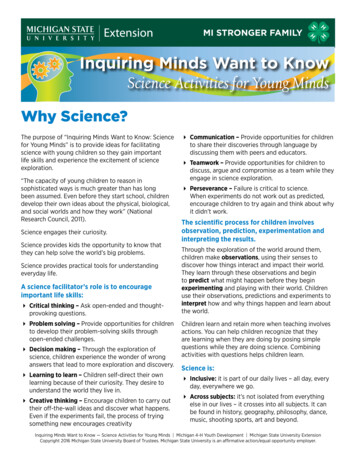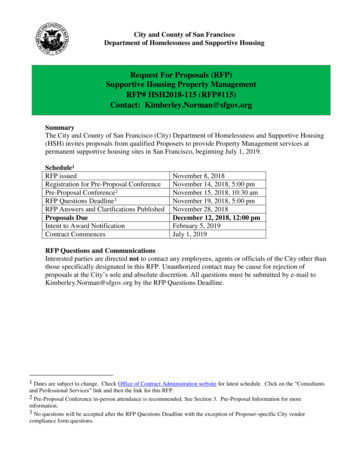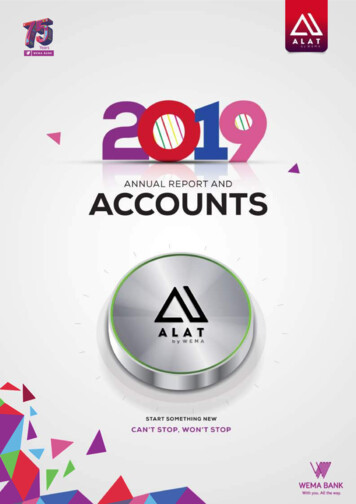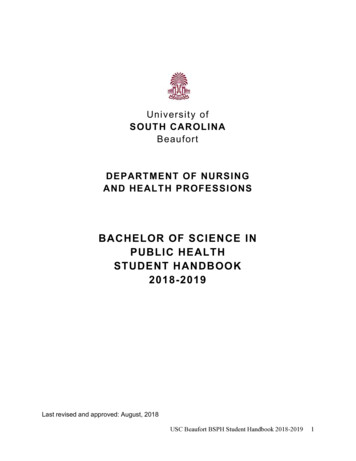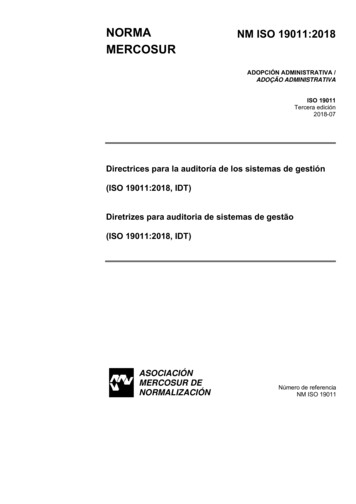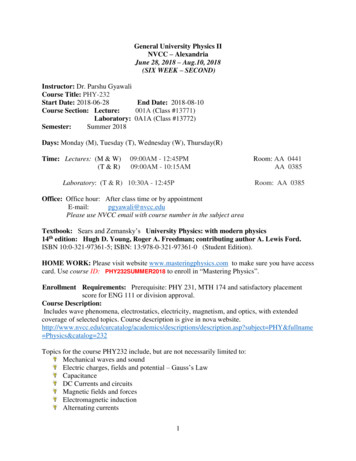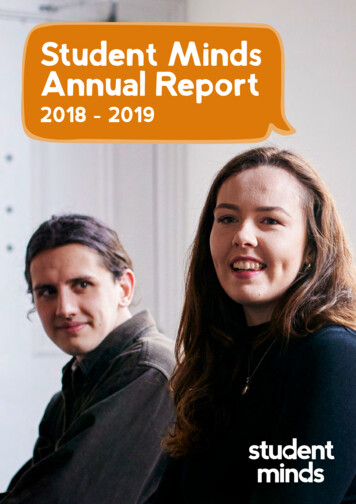
Transcription
Student MindsAnnual Report2018 - 2019
Student Minds Annual Report 18/19Contents3Who We Are8Strategic Report8911131415171819Empowering students to have agency, and play a key rolein transforming the state of university mental healthPeer SupportStaff TrainingCampaigningPress AmbassadorsThe Student Minds BlogUniversity Mental Health DayStudent Advisory CommitteeCo-Production Report20212324Supporting the higher education sector to deliver a wholeuniversity approach to mental health and wellbeingUniversity Mental Health CharterAccommodation TrainingStudents’ Union Support Project252628Tackling the biggest national gaps in knowledge and understandingMen’s Mental Health ProjectThe Wellbeing Thesis29Communicating our Message3232333437Our SupportersVolunteersStudent Minds AwardsFundraising and DonationsGet Involved38 What’s Next for Student Minds?39 Trustees Report and Accounts39 Governance and Risk Management41 Financial Review47 End Notes2
Student Minds Annual Report 18/193Who we areOur vision is for healthy studentcommunities across the UK.Mental illness is one of the greatest challengesfacing society today. We believe that universities,as a community setting, present an opportunityto change people’s health outcomes for life.Whilst much progress is being made, there is alot more to be done to address the existing gapsin support, knowledge and strategic action.Student Minds works with students, serviceusers, professionals and academics to developnew and innovative ways to improve the mentalhealth of students. We empower students andmembers of the university community to developthe knowledge, confidence and skills to look aftertheir own mental health, support those aroundthem, and create change, so that all in highereducation can thrive.Data highlights:50% of young peopleenter higher educationin the UK.Roughly 1 in 3 students experience clinicallevels of psychological distress.This can contribute to decreasedperformance and interpersonal problems.In turn, this can lead to academicfailure and dropout, job difficulties,and negative social outcomes.Our Strategic PrioritiesEmpowering students to have agency and play akey role in transforming the state of university mental health.Supporting the higher education sector to deliver a whole universityapproach to mental health and wellbeing.Tackling the biggest national gaps in knowledge and understanding.Our ValuesCollaborativeCourageousEmpoweringInnovative
Student Minds Annual Report 18/194A message from ourCEO and Chair of TrusteesDear Friends and Supporters,Each year when it comes to writing this introductionto our annual report, we comment that surelythis year must be the biggest and most excitingfor the charity yet. This year is no different. Whatdoes feel different, however, is the way we’vechallenged ourselves to be more courageous.This is one of the four values (alongside beingempowering, innovative and collaborative) thatwe agreed with our networks this year. Whilstthe other three felt like they were part of ourculture already, looking at the current social,environmental and political landscape and takinginspiration from the thousands of courageousstudents we have the honour of working with, weknew that we needed to ramp up our courage!That’s why in 2018/19 we set in motion the biginitiatives that we believe will truly create healthyuniversity communities and sustainable culturalchange over the next decade and beyond. TheUniversity Mental Health Charter and our Students’Union Support Programme in particular have beenconsidered ‘game changers’ by students, staffand ministers alike. These core programmes aredesigned to be long term – a commitment to thenext decade in a world where increasingly shortterm thinking could potentially be doing more harmthan good.‘Courage also involves getting stuck inwith complex work – it’s true thatnothing worth doing is easy.’Our teams have been working hard on manytopics that haven’t been tackled before, fromlearning how to develop effective digital wellbeinginterventions for postgraduate students to lookingat inequalities experienced by male students.It also goes without saying that we had to digdeep for courage when deciding to relocate ourorganisation from Oxford to Leeds. We are verygrateful to our local partners Leeds UniversityUnion and the University of Leeds, who helped tomake this a smooth and successful transition.Courage also involves acknowledging and learningfrom the parts that aren’t working as well as we’dlike. We’re committed to doing better in a numberof areas in the year ahead. This includes settingclear objectives for how we become an organisationthat better represents and responds to the interestsof BAME students, investing more in our policydevelopment infrastructure so that we can betterrespond to changes in higher education and mentalhealth services, and developing our internal projectand relationship management systems for our ever–growing network – which now contains thousandsof individuals!Looking back also gives us the opportunity tocelebrate our successes over the year, and we’dlike to take this opportunity to say thank you to thepeople behind them.Thank you to our hundreds of inspirationalvolunteers, fundraisers, and university communitypartners. Thank you to our dedicated andhardworking staff team, our thoughtful trustees,and our clinical and student advisors. Thank youto our generous funders and our committedpartner organisations in the UK and internationally.Thank you to everyone who has shared their storywith us, campaigned for change, and supportedresearch and development projects to help the nextgeneration. It’s a cliché, but teamwork truly doesmake the dream work.Against the developments outlined in this report,and an increasingly complicated political backdrop,it’s time for us to now develop our next strategicplan. We already have a strong sense of ourdirection. However, in a fast moving world, thereare always new tactics to try and new ideas to
Student Minds Annual Report 18/195consider. We always learn from our supporters andthose interested in our work, so we want to hearfrom you. Tell us what you think. What do you feelwe should keep doing, start doing, or stop doing? Ifyou have an idea or insight you want to share, emailus at courage@studentminds.org.uk or tweet@StudentMindsOrg.‘Achieving lasting change foruniversity communities meansdreaming big together.’We also want to hear from people and organisationsthat can help us reach our goals. It is remarkablefor a small charity with a modest income to havethe level of impact we’re having across the UKbut, honestly, it can also be really tough. It’s toughbecause we currently have to say no to some thingswe know would change lives, it’s tough because wewant to be able to invest more in the developmentand wellbeing of our hard–working staff andvolunteers, and it’s tough because there is so muchmore we want to do. We know that our organisationhas the right values to drive this change, and weknow that achieving lasting change for universitycommunities means dreaming big together andensuring members of these communities are at theheart. We hope you’ll dream big with us!Rosie Tressler OBEDr Nicola Byrom
Student Minds Annual Report 18/196Highlights from the YearJuly 2018December 2018LGBTQ Students’ MentalHealth Report LaunchedIn July, we launched our LGBTQ StudentsMental Health Report. Our research, carriedout in 2017/18, explored the intersection ofLGBTQ identity and experiences of mentalhealth difficulties among students in highereducation. The report addresses issues includinginvolvement in the local and university LGBTQ community, perceptions of peer support,experiences of mental health difficulties,attitudes and intentions towards help–seeking,and perceptions of services and care. Expansion and move to LeedsIn December, we moved up North to our new,spacious office in Leeds, and gained six new teammembers at the same time. Thank you to LeedsUniversity Union and the University of Leeds foraccommodating us!August 2018Men’s Mental Health Project beganWe were extremely excited to receive fundingfrom Comic Relief in August to undertake athree–year project looking at male students’mental health. You can find out more aboutwhat we’ve been up to so far on page 26.September 2018SMaRteN AnnouncementSMaRteN, a brand new dedicated studentmental health research network, launched inSeptember – with Student Minds as their maincharity partner. Since launching, they haverun three workshops to facilitate knowledgeexchange and have distributed 100,000 offunding for research into student mental health.February 2019Co–Production toolkit launchedIn February, we launched our Co–Productiontoolkit (p. 19). This was created to support highereducation institutions to make a long termcommitment to creating mental health strategiesin collaboration with their students, valuing theirexperiences as being central to improving mentalhealth at our universities and colleges.March 2019University Mental Health DayThe whole university community came togetherto use their voices on University Mental HealthDay, taking place this year on March 7th (p. 17).We were delighted to see 248 groups across thecountry joining in and helping to shape the futureof student mental health.Charter RoadshowMarch was a busy month as we also travelled allacross the UK to hold consultation events for theUniversity Mental Health Charter (p. 21). Thisfeedback has shaped the Charter’s key principles,which will be published in December 2019.
Student Minds Annual Report 18/197May 2019June 2019Students’ Union Support ProgrammeAnnouncementIn May, we announced that we will be workingwith several students’ unions across the UKto create and launch a support programmethat seeks to define and develop the role thatstudents’ unions can play in transforming thestate of student mental health nationwide (p. 24).Office for Students’ Grants AnnouncementIn June came another exciting announcement– the Office for Students will be granting 14.5million funding for ten projects supporting studentmental health over ten years. Student Minds isdelighted to be involved in three of these projects:working to support international students, creatingand strengthening local partnerships betweenuniversities and the NHS, and enhancing studentmental health through an online curriculum andpedagogy toolkit.Rosie’s OBEThe year ended on a very positive note when ourCEO, Rosie Tressler, was awarded an OBE in HerMajesty The Queen’s Birthday Honours List 2019,in recognition of her services to Mental Health inHigher Education. Congratulations, Rosie on thiswell–deserved accolade – we are all incrediblyinspired by what you have achieved.The Year in Numbers2Influential reports published846Informal peer supportworkshop attendees79Student Peer Supportfacilitators trained21,219Visitors to theStudent Minds Blog123University staff memberstrained to run workshops2,274Contributors to ourCharter Survey150 Peer Support Group attendees248Events on University MentalHealth Day 223,031 Raised by our supporters
Student Minds Annual Report 18/198Empowering students tohave agency, and play akey role in transformingthe state of universitymental healthFor decades, ‘nothing about us without us’, hasbeen a mantra used by those working to improveinclusivity in healthcare. It’s about creating cultureswhere those that may be impacted by changes topolicy, services or structures have a strong voice inshaping and making decisions that are about them.Empowering students is a core value for StudentMinds. From our beginnings, when a group ofpassionate students started talking about navigatinguniversity with a mental illness, we’ve believed andtrusted that students can, and should, be at theforefront of making the changes they want to seein their own lives and wider society. We know thatthe best way to tackle stigma and create a moresupportive, equal university experience is to co–design our approaches with students themselves– students from all backgrounds. There is a widerange of evidence from research and practice (someof which we explore in our co–production toolkit),which demonstrates that to create accessible,timely and relevant support and prevent some ofthe root issues, lived experience must be a keycomponent from start to end.With excellent training, support and supervisionfrom Student Minds, our student volunteersdevelop the knowledge, confidence and skills tocreate the change they want to see in the world.They can learn how to listen effectively to flatmatesor teammates who are experiencing difficulties,and help motivate them towards support. Theycan learn how to safely and effectively run a peersupport group for students experiencing low moodor difficulties with food. And finally, they can learnhow to identify the key issues students are facing intheir communities and deliver evidence–informedcampaigns at meetings or in the media, usingstorytelling skills to advocate for their peers.Over the next few pages, you will see what we havedone to empower students this year – spoiler alert,students are ‘using their voices’ and it’s about toget louder!
Student Minds Annual Report 18/199Peer SupportOur formal peer support programmes bringtogether students with similar experiences tosupport one another. We know students aremore likely to seek help from their peers thanfrom formal service providers – according toresearch by the Equality Challenge Unit*1, 75%of students who experience mental healthdifficulties disclose these to their peers or friends.Our student–run groups therefore have animportant role to play within the whole supportlandscape at universities. Our model focuses onproviding thorough training to student facilitators,coupled with ongoing support and supervision.The two–day training programme focuses on keyfacilitation skills and how to ensure the groups aresafely run, with ground rules and boundaries.All facilitators are provided with supervision fromone of our volunteer supervisors after every sessionthey run. Our team of supervisors are all recentgraduates who facilitated a Student Minds peersupport group whilst at university. The team aretrained and supported by our Clinical Supervisor,who provides a reflective space for the studentfacilitators’ ongoing skills development.‘Hearing other people speak about theirexperience, I realise it’s normal and I’mnot alone.’ - AnonymousData highlights:79 studentswere trained this year torun courses and workshops to other studentsat their universities.Over 150 studentssupport groups.*2attended our peerPositive MindsOur Positive Minds course supports students whoare experiencing low mood and is structured to helpcombat the key aspects of depression. The coursewas designed by Dr. Denise Meyer using materialfrom Student Against Depression. The frameworkhelps attendees to avoid rumination, encouragingthem to engage in specific tasks and create concreteplans for change with small, achievable stepsinstead. In addition, the groups help attendees tobuild social contact, helping to break isolation. Thisyear, 15 of our student groups ran Positive Minds.Eating DifficultiesWe offer two types of peer support groupsfor students experiencing eating difficulties:unstructured and structured. Both groupsprovide a welcoming space for any student whois experiencing difficulties around food or bodyimage to explore their thoughts about treatment,recovery and university life in general. Ourstructured course, Motivate Me was designed incollaboration with Professor Janet Treasure OBE,director of the Eating Disorder Unit and Professorof Psychiatry at the Institute of Psychiatry, King’sCollege London. The course focuses on supportingattendees to manage the underlying psychologicalmechanisms and challenges commonlyexperienced by individuals with eating difficulties.This year, two of our groups ran Motivate Meand one group ran an unstructured course.We also offer students the opportunity to runSupporting Supporters workshops. These focuson providing students supporting a friend withmental health difficulties with an understandingof specific mental health difficulties/behaviours,the practical skills for supportive conversations,and advice on setting boundaries and looking afterthemselves, too.*1 The Equality Challenge Unit is now Advance HE*2 We do know that not all attendees complete a feedback form, so in reality this number may be higher.
Student Minds Annual Report 18/19This year two of our groups ran our SupportingSupporters – Eating Difficulties workshops. Overthe next year, we plan to develop our supportoffer for student facilitators to ensure they arefully equipped with the knowledge, confidenceand skills to give as many students as possiblethe opportunity to attend formal peer support.Thanks to the support of The AIM Foundation,we will also be developing new materials forstudents to run pilot workshops to build studentattendees’ resourcefulness tools, to build andmaintain good wellbeing.Peer Support Train the TrainerIn 2017 we developed our peer supportprogrammes into a Train the Trainer model toenable staff in universities and students’ unionsacross the UK to set up and run initiatives at theirown institutions. The course content is based on theknowledge and skills we’ve acquired from deliveringpeer support groups over the last decade. Thisapproach is beneficial as it enables staff to offermore localised training and support to studentfacilitators.This year, we continued to support staff at fiveinstitutions trained in 2017/18, and trainedmembers of staff from Birmingham City University,the University of Hull and the University of Surreywho we will now support to run initiatives over thecoming year.We have learnt that after the training it can taketime for individuals to implement all the necessarypolicies and procedures to run peer support attheir institutions. We will be exploring how we canimprove our model to help speed up the processgoing forwards.10Case Study:‘I have found my experience as a facilitatorto be rewarding – it has been a pleasureto be a part of an environment in whichstudents support each other and offer hopeto each other with the difficulties they arefacing. I also enjoyed the publicity side ofthe voluntary work with Student Minds andopening up conversations about studentmental health.I have enjoyed volunteering with skilledand like–minded people and building oneach other’s strengths to provide a goodexperience for attendees. It has also beenrewarding to see the benefits students gainfrom joining the group and noticing thingsthey take on board to improve their wellbeingthrough group discussions.’Kirsty Firman, talks about her experience ofbeing a facilitator at the University of Cardiff.
Student Minds Annual Report 18/1911Staff Training ProgrammesNavigating university life and the ups and downsit brings can be tricky. We know that studentsare most likely to turn to friends when they areexperiencing difficulties. Our Look After YourMate and Mental Health in Sport Train the Trainerprogrammes are designed with this in mind.We work with universities to strengthen thesenaturally occurring systems of support, by providinguniversity staff with the training skills and resourcesto deliver effective, evidence–based informal peersupport workshops to students.Look After Your MateOur Look After Your Mate workshop empowersstudents to support friends who are experiencingmental health difficulties, whilst also ensuringthey look after their own wellbeing by maintainingboundaries and signposting. We want students tofeel confident in supporting their friends and feelcomfortable confiding in each other.Case Study:‘I chose to do the Look After Your Matetraining as it directly corresponds with myrole on a daily basis. I predominantly workwith mature higher education students whocome to university usually after a prolongedperiod of time away from education, sothe transition into higher education oftenaffects their mental health. The traininghas assisted in spreading the ultimatemessage of supporting your peers andhow to identify and converse about mentalhealth and wellbeing, alongside lookingafter yourself, which is often overlooked.’Sarah-Jane Hewson, a Look After YourMate trainer at University Campus NorthLincolnshire talks about how the traininghas assisted her in her role as a HigherEducation Student Support Officer.‘It was really engaging and the discussionsincredibly thought–provoking,’ one trainer told usafter the course. Another summed it up in threewords; ‘practical, engaging and empowering.’Students who attended Look After Your Mateworkshops found that their mental health literacyincreased. They also learnt a range of reflectivelistening skills to help them support a friend or peerthrough their difficulties. One attendee reported:‘I will be more proactive and confident instarting a conversation, but at the sametime remembering to set and respect myown boundaries.’Data highlights:86 staff memberswere trained this year,taking our network of staff trainers up to 254in total, at 91 Higher Education Institutions.Trainers had a 50% increase in theirconfidence in their ability to train students inmental health awareness and supporting afriend by the end of the course.95% of trainersfound the course useful.Our trainers ran 122 workshops to 702students across the UK: 88%rated their skills, confidenceand knowledge after the workshop asgood or excellent.87%of students felt that theworkshop was useful or very useful.
Student Minds Annual Report 18/19Mental Health in SportOur Mental Health in Sport course was developedin collaboration with BUCS (British Universities andColleges Sport).Physical activity is proven to have a positiveeffect on wellbeing, with higher levels of activityassociated with improved quality of life andwellbeing, as well as reduced anxiety, depressionand body dissatisfaction. With this connection inmind, our course was designed to equip universitysport staff with the knowledge, confidence andskills to make sport at their university inclusive ofindividuals experiencing mental health difficulties.The two–day programme includes the HigherEducation Mental Health First Aid course, alongsidesessions on best practice for setting up accessibleand inclusive sports programmes, and an overviewof running the Mental Health in Sport workshopfor students. The Mental Health in Sport workshopgives students the skills to recognise and supportteammates experiencing mental health difficulties,and help in creating an action plan for promotingan inclusive club culture.Data highlights:37 staff memberswere trained this year,taking our network of staff trainers up to 88 intotal, across 36 Higher Education Institutions.100% of trainersfelt they had the necessaryskills to run workshops on campus after thetraining.Our trainers ran 30 workshops to 144students across the UK this year.* 86% of student attendees felt theworkshop was useful.46%reported an increase in havingthe necessary skills to support a teammate who is experiencing difficulties.12At the end of the Mental Health in Sport training,participants were keen to take what they had learntback to their campuses, with one telling us that theywere ‘looking forward to practising and deliveringthe workshop.’Student attendees told us that the workshopsinspired them to put action plans into place tocreate positive change within their teams. Forone attendee, this was to ‘make socials more foreveryone and make sure club members knowwhere they can access help whether from the unior club,’ whilst another planned to ‘establish awelfare action plan and support page for my club.’One student told us that they now felt able to reachout to teammates who they were concerned aboutbut had previously not been ‘confident on how toproperly approach them.’Case Study:‘I chose to do the training to understand thescope of mental health for student sportmore broadly and to learn how to engagesports clubs to reflect the principles in theirclubs and teams. We have received reallypositive feedback from student groupsand was great to see them visibly engagedwith the content – we have already seen apositive shift in club culture and an increasedengagement with campaigns and charitywork focused on raising awareness of mentalhealth.’Jamal El-Kalawy at Leeds University Uniontalks about the impact the workshops havehad for sports teams at the university.Looking forwards, we plan to continue to grow ourtrainer network, increasing connectivity betweentrainers at different institutions. Alongside this, weare continually developing and updating the contentof our training programmes and using feedbackfrom trainers to shape this.*This figure is based on the average number of feedback forms received between Time 1 and Time 2
Student Minds Annual Report 18/1913Student-Led Campaigning‘By opening up and sharing my experiences, I haveencouraged others to do the same,’ says AneeskaSohal, chair of Student Minds York in 2018/19.‘I have understood the power of sharing humanexperiences, and that by discussing these together,you can come up with ideas to help improve thesupport around you, in ways you never thoughtwere possible!’Our York group is just one of the student–ledcampaign groups we support across the country todeliver a range of events and initiatives to improvestudent wellbeing and mental health literacy.This year, our 23 groups across the country haveachieved some great things, from lobbying for anopt–out from the public display of exam results toworking in partnership with other student groupson campus to challenge mental health stigma.After the successful launch of our LEAD modelof campaigning training last year, we continuedto train new members of these groups to Listen,Empower, Action and Debrief.The training enables our campaign groups to makea concerted effort to identify and understand thechallenges that students face on their campuses andthen take action to create change. We offer skillsdevelopment, coaching and ongoing support to ourvolunteers to ensure they are empowered to makean impact. We also equip our campaign volunteerswith the knowledge and skills to put these newprinciples into use, and to strive for both local andnational positive change.Looking forwards, we plan to significantlyexpand our student–led campaigning work intoa nationwide Leaders Movement. We will becrowdfunding throughout 2019/20 to support thiswork. Depending on the amount raised, the supportwe are able to provide in future could range fromtraining individual leaders and providing them withan online platform to organise, to fully fledgedpilots supported by regional community organisersacross the UK. You can support the movement orfind out more here.Data highlights:In 2018/19, we trained 42 students from21 universities across three sessions.Case Study:‘Between July 2017 and June 2018, theStudent Minds Bath team primarily focusedon lobbying the university for changes toits personal tutoring system. The mainachievement that arose from this campaign(called ‘Time for Tutees’) was the formationof a working group comprised of students’union, Student Minds Bath and Universitystaff, which is now working to refine andimplement changes based on a paper wewrote on the topic (based on student/staffconsultation i.e. focus groups). The membersof last year’s team got involved for variousreasons, most commonly: personal/friends/family experiences with mental difficultiesand to gain experience in a mental healthvolunteering role. The team’s favourite partof being involved with Student Minds is alsosplit amongst its members: the rewardingexperience of creating tangible change,strengthening the student voice with regardsto mental health and meeting like–mindedpeople who all share a great passion forstudents’ mental health.’Patrick Taylor, chair of Student Minds Bath,tells us about his group’s achievements overthe past year.
Student Minds Annual Report 18/1914Press AmbassadorsThe narrative of student mental health isincomplete without the voice of students. This iswhy we coach, support and train Press Ambassadorsto use their voices to influence positive changein student mental health. Press Ambassadors arestudents and recent graduates with lived experienceof mental health difficulties whilst at university.We support these brave and passionate volunteersto share their stories with press and mediaorganisations, and at events. Our training empowersstudents to share their personal experiences in safeand positive ways, and provides them with the toolsto have these experiences heard.[I am] proving that I am stronger thanmy eating disorder tries to convince methat I am.’ - Jessica MellStudents are experts by experience – theyknow how it feels to experience mental healthdifficulties at university. We work hard toamplify their voices, and encourage the publicto listen to what they have to say, in order tochallenge existing stereotypes and stigma.Together we can change public perceptions ofstudent mental health. In 2018/19, we trained anetwork of 18 Press Ambassadors with a variety ofpersonal experiences.Data highlights:100% of Press Ambassadors strongly agreedthat the training was useful and well organised.Some highlights from the year are as follows:Rebekah Dussek spoke to Channel 5 News onUniversity Mental Health Day about her mentalhealth journey.Annie Bocock wrote an article for Times HigherEducation on coming out as pansexual at university,and the impact suffering from anxiety had on herexperiences.Laura, Abigal and Daisy shared their experiences ofaccessing mental health services at university withThe Huffington Post.Case Study:‘The experience of being a Press Ambassadorfor Student Minds means having a really goodopportunity to do something you know isgoing to have a positive impact on students’wellbeing, because they are so well followed.On a personal level I have gained more selfconfidence about speaking about my ownmental healt
Student Minds Annual Report 18/19 7 June 2019 Office for Students' Grants Announcement In June came another exciting announcement - the Office for Students will be granting 14.5 million funding for ten projects supporting student mental health over ten years. Student Minds is delighted to be involved in three of these projects:

